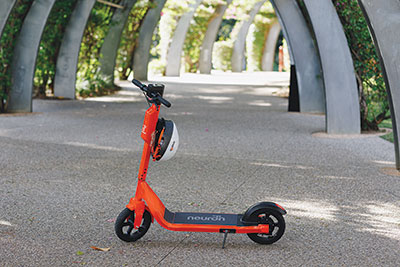Brisbane City Council has found an unexpected transport option to help healthcare personnel travel to work – the city’s shared e-scooter programme.
According to Dr Jake Whitehead, Tritium E-Mobility Fellow at The University of Queensland, “Now, more than ever, everyone is focused on providing as much support as possible for the indispensable health workers who are battling to stop the spread of COVID-19, and those who are keeping our streets safe, our mail delivered, and our grocery shelves stocked.
“Electro-mobility options, like e-scooters, provide essential workers with a convenient mode of travel to and from work, while reducing air pollution, which has been linked to severe health impacts globally, including increased death rates due to COVID-19.”
Given the highly-contagious nature of COVID-19, and current social distancing guidelines, many essential workers are preferring e-scooters over other forms of transport.
In support of efforts to combat the spread of the virus Brisbane’s remaining e-scooter operator, Neuron, has been offering free passes to Brisbane’s public health workers who still need to commute each day.
As part of the initiative, e-scooters are being positioned in locations that improve transport options for medical professionals.
Over 500 public health workers from across the city have registered for the free monthly pass and the uptake of free rides has been in the thousands.
Brisbane City Council has been working closely with the company to respond to the threat of COVID-19.
A dedicated sanitisation team, armed with hospital-grade disinfectant is working around the clock to keep e-scooters germ-free.
Measures have also been introduced to help keep operational staff from catching and spreading the virus.
A recent rider survey showed a quarter of all Neuron e-scooter trips replaced short car journeys.
Trip data showed over 60 percent of all rides in Brisbane started or finished within 100 metres of a train station or bus stop, with 67 percent of customers saying they use the service for their daily commute.
The data also found 87 percent of users believe the e-scooter program has created positive impacts for the city of Brisbane.
Additionally, Dr Whitehead said, “While we are seeing the benefits e-mobility schemes can deliver for essential workers today, importantly, these affordable, convenient and clean modes of transport could form a crucial component of the economic recovery following COVID-19.”

















